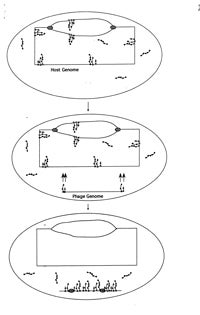Infection of Bacillus subtilis by bacteriophage SPO1 causes profound changes in the genetic processes of the host cell. Synthesis of host DNA, RNA, and protein is shut off, presumably to prevent those syntheses from competing with the corresponding phage biosyntheses for materials, energy, and access to biosynthetic machinery. Such global redirection of the cell's resources requires regulatory mechanisms of great sophistication and specificity, to eliminate the host-specific biosyntheses, while exactly the same processes, specific to the phage genome, proceed with enormous efficiency in the same cell. We are analyzing the mechanisms by which SPO1 accomplishes this takeover of the host cell. We have identified a cluster of 24 genes in the terminal redundancy of SPO1, which specifies most or all of the necessary machinery. By observing the effect of expression of each gene in uninfected cells, and the effect of mutational inactivation of each gene on the progress of infection, we are defining the specific roles of the 24 gene products. Activities that have been identified for specific gene products include: (1) shutoff of host DNA and RNA synthesis; (2) regulation of the timing of those shutoffs; (3) inhibition of host cell division; and (4) regulation of expression of the 24 genes. The broad spectrum bactericidal activity of some of these gene products makes them a potential basis for development of

WEBSITE(S)| PubMed Publication List | Stewart Lab
Research Areas
Molecular Genetics, Microbial Biotechnology, Bacteriophage biology

Stewart Lab
Education
B.S. Zoology (1962) University of Wisconsin
Ph.D. Genetics (1967) Stanford University
